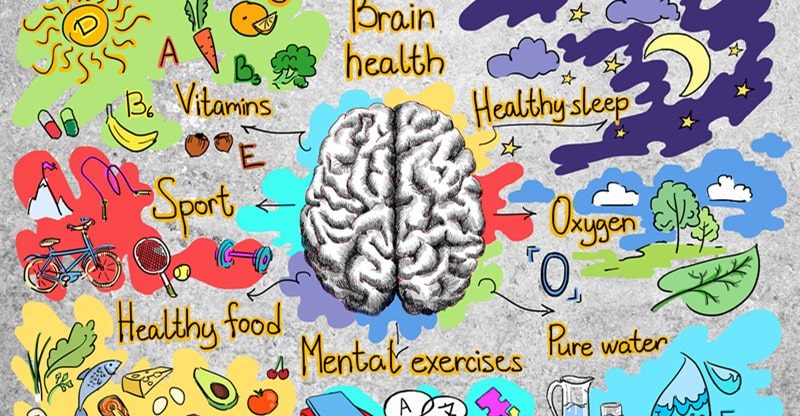How To Keep Your Brain Healthy
As the organ that directs body function, the continued good health of the brain is a must in maintaining overall well-being. However, the lack of awareness of symptoms that signal brain issues or adopting unhealthy habits can quickly turn insidious damage into unmanageable emergencies.
For instance, unhealthy diets, like greasy fast food and supermarket favorites loaded with salt, trans fat, and preservatives, have become mainstream. Often taken for granted, this diet contributes to obesity, predisposing the brain to clogged and deformed blood vessels.
In contrast, vital factors in lowering the risk for chronic diseases and mental decline are a healthy diet and lifestyle changes. Just like the useful information found on DickinsonNeuroSurgery.com, the following sections will explore numerous ways to maintain optimal brain health.
1. Keep Your Blood Vessels Healthy
Maintaining healthy blood pressure levels is crucial for keeping the brain healthy and reducing the risk of neurological conditions such as mental deterioration, dementia, and stroke. Yet, the Centers for Disease Control cautions that around 47 percent of American adults, translating to approximately 116 million individuals, are grappling with hypertension.
Hypertension is characterized by systolic blood pressure surpassing 130 millimeters of mercury, diastolic blood pressure exceeding 80 millimeters of mercury, or the need for medication to manage high blood pressure. This situation is alarming, especially considering that information about maintaining optimal blood pressure and necessary treatment options is widely accessible.
Aside from hypertension, high cholesterol levels, smoking, diabetes, obesity, family history, sedentary lifestyle, inflammation, and aging contribute to plaque formation and calcification along the luminal wall of the arteries and around the heart’s valves.
Plaque formation is serious and can lead to the following:
• Inflammation of the arteries due to plaque formation can lead to cerebral artery disease, which can cause a reduction in blood flow to the brain and increase stroke risk.
• Formation of blood clots that can block blood flow to the brain and cause an ischemic stroke.
• Chronic inflammation can also lead to the thinning of the plaque’s fibrous cap, making it more vulnerable and increasing the risk of rupture. Fragments can lodge in the smaller blood vessels and cause embolism.
• Plaque buildup in the arteries can cause an aneurysm or the weakening and bulging of the arterial wall. Because it is thinned out and very weak, it can burst and cause a life-threatening hemorrhagic stroke.
Strokes cause weakness or paralysis, difficulty speaking or understanding speech, vision problems, vascular dementia, and death. Though genetic predisposition is irreversible, the other risk factors are manageable.
Managing hypertension and plaque formation with medication, lifestyle changes like sticking to a low cholesterol, low salt diet, and under the guidance of a healthcare professional, keep blood vessels healthy and reduce the risk of stroke and other brain-related diseases.
2. Be Aware Of Signs And Symptoms
As men advance in age, the likelihood of developing severe asymptomatic carotid stenosis, a condition that narrows the arteries supplying blood to the brain, increases. Notably, in men aged 80 or above, approximately 31 out of every 1,000 are found to have this condition. In contrast, women of the same age bracket have a lower prevalence, with about 9 out of every 1,000 women being affected.
Knowing the early manifestations of conditions like aneurysm, trauma, fluid buildup, brain tumor, or epilepsy is essential because catching the disease early in its course leads to better outcomes.
Some of the signs and symptoms include:
• severe headaches
• seizures
• blurry vision
• inability to walk straight
• difficulty speaking or understanding speech
• memory loss
• confusion
If you experience any of these or know of anyone who does, seek medical attention immediately.
3. Eat A Mediterranean Diet And Avoid A High-Sugar Diet
The Mediterranean diet is considered heart and brain-healthy, a claim backed by studies linking it to a lower risk of cognitive decline, dementia, and Alzheimer’s disease. Improved brain health is among its many benefits.
Here are some tips for following the Mediterranean diet:
• Eat plenty of fruits and vegetables.
• Choose whole grains over refined grains.
• Eat legumes and nuts at least a few times a week.
• Choose lean protein sources, such as fish, chicken, and beans.
• Limit your intake of saturated fat, trans fat, and processed foods.
• Use olive oil as your main cooking oil.
• Drink plenty of water.
To ensure optimal cognitive performance, it’s crucial to preserve the size and density of the brain Brains can shrink due to chronic conditions or get scarred from blood and oxygen deprivation, post-stroke, or bleeding.
The good news is that nutrition can make a difference. For instance, research shows that sticking to a Mediterranean diet improves memory and mental performance in older adults. This may be due to the diet’s emphasis on whole grains, fruits, vegetables, nuts, legumes, and healthy fats, rich in nutrients and antioxidants that support brain health.
In addition, the Mediterranean diet is low in processed foods, red meat, and saturated fats, which cause inflammation and oxidative stress and can contribute to a decline in mental performance.
Can the Mediterranean diet be improved even more? The answer is a resounding ‘yes’ because older adults who followed a green Mediterranean diet or Green Med diet had greater brain volume than those on comparatively healthy diets.
The Green Med diet is the standard Mediterranean diet incorporating Mankal (an aquatic plant with a high quantity of polyphenol), walnuts, and green tea—all with strong anti-inflammatory and antioxidant properties, which strongly suggests that the diet may help protect against age-related brain atrophy.
On the other hand, a high-sugar diet has been associated with the opposite. Over 58% of Americans exceed the suggested dietary guidelines by consuming over 20% of their total calories from added sugars, averaging at about 25 teaspoons a day. Too much added sugar can lead to a number of health problems, including weight gain, obesity, type 2 diabetes, heart disease, and stroke.
4. Exercise Regularly
Regular exercise can improve cognitive function and reduce the risk of cognitive decline. The CDC suggests that adults spend at least 150 minutes weekly on moderate-intensity exercise or 75 minutes on vigorous-intensity weekly exercise to maintain good health. Dancing, walking the dog, and taking active breaks between passive activities like watching TV or reading help.
5. Stay Socially Active
Social isolation has been associated with cognitive decline and other health problems like depression and heart disease. As many as 24% of Americans 65 years old and above suffer from social isolation.
Being alone encourages unhealthy behavior like increased alcohol intake. They can also smoke more, become sedentary, neglect to take medicine, and find it difficult to enjoy a restful sleep.
Staying connected with family and friends, joining a club or group, or volunteering in your community are doable social activities that help maintain good brain health.
6. Prevent Memory Loss By Staying Mentally Stimulated
Just as the body needs regular workouts to stay fit, so too does the brain. Regular mental stimulation is key to preventing memory loss and keeping your cognitive faculties sharp.
Imagine this: you’re at a party and your friend introduces you to someone new. An hour later, you’ve forgotten their name. This is a common occurrence for many and can be indicative of the brain’s craving for more mental exercise.
One effective way to boost your memory is by regularly engaging in activities that challenge your mental faculties. This can range from crossword puzzles, Sudoku, or even brain-training apps that are specifically designed to keep your mind sharp.
Learning a new skill or language or simply indulging in reading can also greatly contribute to cognitive stimulation. Learning helps the brain forge new synaptic connections, enhancing its resilience against memory loss.
7. Quit Smoking And Avoid Alcohol
Smoking, which can constrict blood vessels, has been linked to a higher risk of confusion, memory decline, dementia, brain atrophy, and reduced brain volume.
While nicotine can cause short-term cognitive improvements, chronic smoking can lead to attention, memory, and decreased capacity for higher-order thinking like planning, organization, and adapting to changing situations.
Similarly, alcohol consumption can also have negative effects. For instance, while one drink is fine, heavy alcohol use can cause brain damage and cognitive impairment, including memory loss, difficulty with problem-solving and decision-making, and reduced attention span. Limiting alcohol and quitting smoking are advisable, as moderate alcohol consumption is associated with an increased risk of dementia.
8. Manage Stress And Get Enough Sleep
Not getting enough sleep and constantly dealing with stress can do a real number on your brain health. It’s a well-established fact that enduring long periods of stress can lead to issues like forgetfulness, difficulty concentrating, and an overall inability to manage mental tasks effectively.
Sleep recharges and resets the brain, so much so that even short periods of sleep deprivation can affect memory because the brain has no chance for memory consolidation.
Spending time with family and friends, or even just talking to someone about your stressors, can help reduce stress and improve mental health.
Stress management techniques like meditation or yoga and aiming for 7-8 hours of sleep each night can help maintain good brain health. For instance, yoga combines physical postures, breathing exercises, and meditation to promote relaxation and reduce the symptoms of anxiety and depression.
9. Prevent Falls
Falls and head injuries can increase the risk of cognitive decline. Based on information from the CDC, falls overwhelmingly lead the pack as the main cause of traumatic brain injuries. Particularly vulnerable to these injuries are individuals who are 75 years and older, marking them as the most at-risk demographic. Removing tripping hazards and wearing appropriate footwear can help reduce the risk of brain-related diseases.
Takeaways
Preserving brain health hinges on a blend of smart dietary choices, physical activity, social connectivity, and adequate rest. Unhealthy habits such as smoking, overindulgence in alcohol, and consuming a high-sugar diet can be detrimental to the brain’s well-being. Recognizing early symptoms, implementing protective measures, and seeking medical intervention as necessary are pivotal in the quest for sustained cognitive health.




